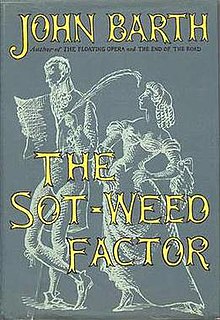 First edition | |
| Author | John Barth |
|---|---|
| Publisher | Doubleday |
Publication date | 1960 |
The Sot-Weed Factor is a 1960 novel by the American writer John Barth. The novel marks the beginning of Barth's literary postmodernism. The Sot-Weed Factor takes its title from the poem The Sot-Weed Factor: Or, a Voyage to Maryland. A Satyr (1708) by the English-born poet Ebenezer Cooke (c. 1665 – c. 1732), about whom few biographical details are known.
A satirical epic set in the 1680s–90s in London and colonial Maryland, the novel tells of a fictionalized Ebenezer Cooke, who is given the title "Poet Laureate of Maryland" by Charles Calvert, 3rd Baron Baltimore and commissioned to write a Marylandiad to sing the praises of the colony. He undergoes adventures on his journey to and within Maryland while striving to preserve his virginity. The complicated Tom Jones–like plot is interwoven with numerous digressions and stories-within-stories, and is written in a style patterned on the writing of 18th-century novelists such as Henry Fielding, Laurence Sterne, and Tobias Smollett.